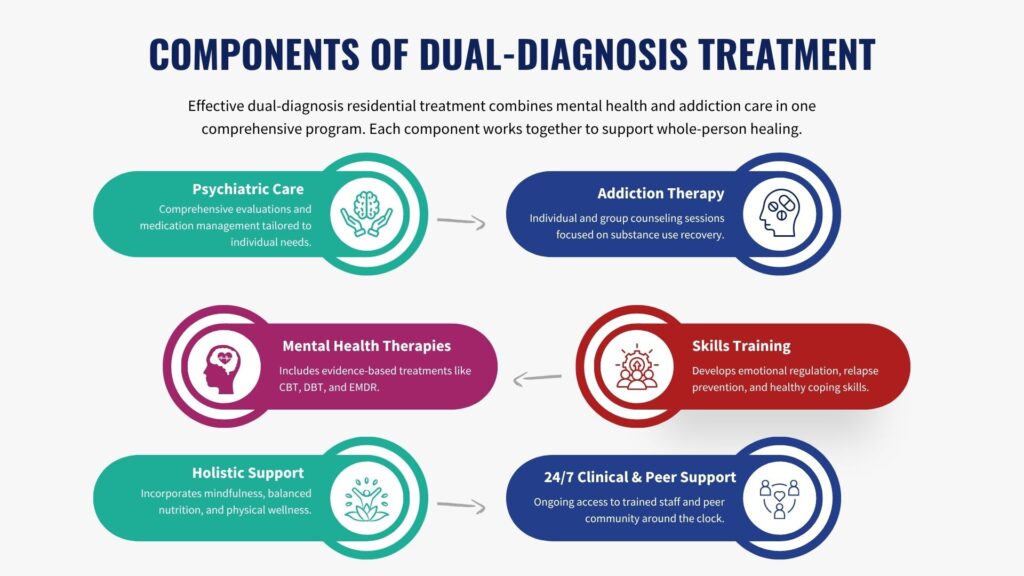Living with both mental health and substance use issues can feel like a cycle you can’t escape. One problem fuels the other, making recovery hard. If you or a loved one feels stuck, you’re not alone—and you’re not beyond help. Dual-diagnosis residential treatment offers a clear, compassionate way forward. Nearly half of people with substance use disorders also have a mental health condition, showing how common this is. With the right care, healing is possible.
Dual-diagnosis residential treatment is a 24/7 care program that helps people facing both mental health disorders and substance use issues at the same time. This integrated approach combines therapy, medical support, and a structured environment to treat the whole person and break the cycle of relapse.
What Is Dual-Diagnosis Residential Treatment?
Dual-diagnosis residential treatment is an intensive, 24/7 program designed to treat both substance use disorders and co-occurring mental health conditions at the same time.
When someone struggles with both addiction and a mental health disorder—such as depression, PTSD, anxiety, or bipolar disorder—it’s called a dual diagnosis. This is more common than many realize. In fact, recent studies show that nearly 21.5 million adults in the U.S. live with co-occurring mental health and substance use disorders, underscoring the urgent need for integrated care. Treating one condition without addressing the other often leads to relapse, frustration, and prolonged suffering.
Substance abuse and mental health issues are deeply connected. Many people begin using alcohol or drugs to cope with trauma, psychiatric symptoms, or emotional pain. Without proper support, the mental health disorder worsens and substance use escalates. That’s why the best dual diagnosis residential treatment centers focus on comprehensive healing that addresses both sides.
Why Does This Level of Care Matter?
Because without treating both addiction and mental illness, recovery rarely lasts.
Someone struggling with depression or unresolved trauma may turn to substances for temporary relief—but that relief comes with consequences. Over time, substance use can intensify mental health issues and even create new ones. Long-term residential treatment for dual diagnosis works because it doesn’t separate the mental from the physical, or the emotional from the behavioral.
Dual diagnosis programs provide a stable, safe environment where people can step away from the triggers and chaos of daily life and begin real healing. This level of care reduces the risk of repeated relapse and gives individuals the tools to manage both mental illness and addiction long-term.
Common Questions and Misunderstandings
What is the most common dual diagnosis?
One of the most frequently seen combinations is substance use disorder paired with depression or anxiety. Many people also experience co-occurring PTSD, bipolar disorder, or borderline personality disorder alongside addiction.
How is dual-diagnosis different from co-occurring disorders?
The terms are often used interchangeably. Technically, co-occurring disorders refers broadly to any combination of mental health and substance use issues. Dual diagnosis typically describes a person who has been formally diagnosed with both. What matters most is that both conditions are treated together.
“You have to fix your addiction before you treat your mental health.”
This is a common misconception. In reality, treating only addiction while ignoring underlying mental health issues often leads to relapse. Integrated treatment programs are built to address both simultaneously—because they influence each other constantly.
“Dual-diagnosis care is only for severe cases.”
Not true. Anyone dealing with both a mental health disorder and substance use disorder can benefit from dual diagnosis treatment. Early, compassionate intervention can prevent things from becoming more severe and harder to treat down the line.
What to Expect in a Dual-Diagnosis Program
Residential dual diagnosis treatment combines evidence-based therapies, medical oversight, and peer support in a 24/7 healing environment.
Here’s what a typical program might include:
- Psychiatric evaluations and medication management: Licensed professionals assess mental health symptoms and prescribe or adjust medications as needed to stabilize psychiatric symptoms.
- Addiction-focused group and individual therapy: Therapy sessions help individuals explore the root causes of addiction and build a support network.
- Mental health therapy: Cognitive behavioral therapy (CBT), dialectical behavior therapy (DBT), trauma therapy, and other approaches target specific mental health disorders.
- Skills groups: Emotional regulation, relapse prevention, communication, and stress management help clients navigate daily life and reduce the risk of relapse.
- Holistic support: Activities like mindfulness, yoga, nutrition, and fitness promote well-being and reconnect individuals to their bodies and values.
- 24/7 staff support and peer connection: A key benefit of residential care is constant access to trained staff and the supportive presence of others walking similar paths.
The structure, safety, and daily routine of inpatient dual diagnosis treatment in Arizona or elsewhere provides the space to focus entirely on healing—mentally, emotionally, and physically.

What Is Dual Diagnosis And How Is It Treated?
Dual diagnosis refers to having both a mental health disorder and a substance use disorder. It’s treated through integrated care that addresses both issues at the same time using therapy, medication, and structured support.
How Does Residential Treatment Help With Co-Occurring Disorders?
Residential dual diagnosis treatment provides round-the-clock care in a safe environment, allowing individuals to focus fully on recovery with help from licensed professionals and supportive peers.
Is Dual-Diagnosis Treatment Effective For Long-Term Recovery?
Yes. When both mental health and addiction are addressed together, individuals have a better chance at long-term recovery. Integrated care reduces relapse risk and builds lasting resilience.
Does Insurance Cover Residential Dual Diagnosis Treatment?
Many insurance plans do cover dual diagnosis residential treatment, though coverage varies. It’s best to contact the treatment center or your provider to understand your specific benefits.
Taking the Next Step Toward Healing
If you’ve been feeling overwhelmed, stuck, or unsure how to get better, know this: you’re not broken. The pain you’re in is real—but it’s also treatable. Dual-diagnosis programs exist because so many people are facing the exact same struggle.
And the good news is that there is real help, real care, and real hope. You don’t have to figure this out alone.
Begin Your Healing Journey with Compassionate Dual-Diagnosis Care at Rock View Recovery!
You deserve support that sees the whole you—not just your diagnosis. At Rock View Recovery, we specialize in dual diagnosis residential treatment in Arizona, designed to address both mental health challenges and substance use disorders in a safe, structured setting. Our compassionate team uses evidence-based therapies to help you heal emotionally, mentally, and physically.
With 24/7 care and a focus on long-term recovery, we’re here to walk with you every step of the way. You don’t have to navigate this journey alone—real, lasting healing is possible. Reach out today and discover what’s waiting on the other side of integrated care.
Quick Tip: Dual Diagnosis Is More Common Than You Think—And You Don’t Have to Face It Alone
Struggling with both a mental health disorder and substance use doesn’t make you weak—it makes you human. Dual-diagnosis residential treatment is designed for people just like you. There’s no shame in needing help. Integrated care works—and it’s here for you when you’re ready
Key Takeaways
- Dual-diagnosis residential treatment addresses both mental health and substance use issues together.
- Integrated care helps break the cycle of relapse caused by untreated psychiatric symptoms.
- Residential treatment centers offer 24/7 structure, support, and safety.
- Evidence-based therapies like CBT and DBT build coping skills and self-awareness.
- You don’t have to navigate this alone—real help and healing are available.
